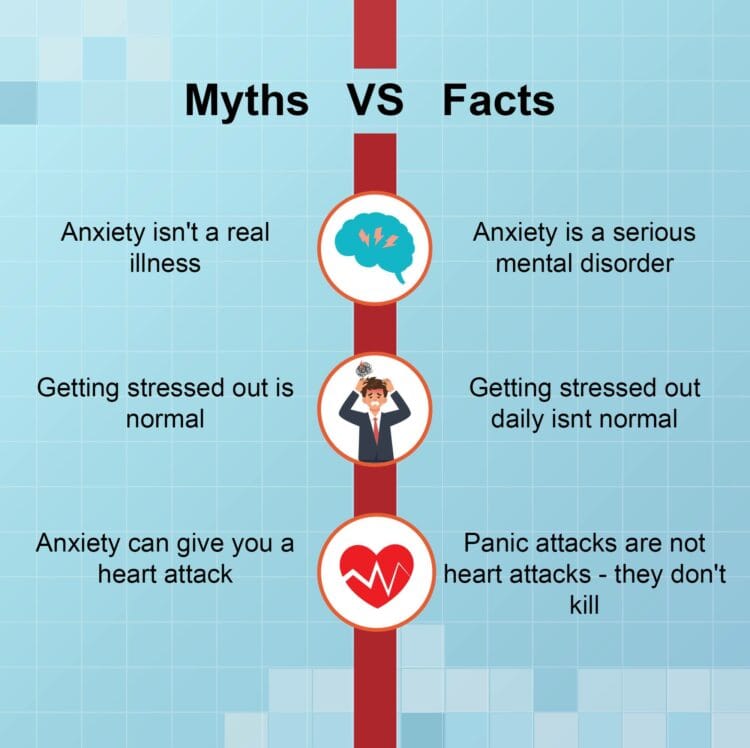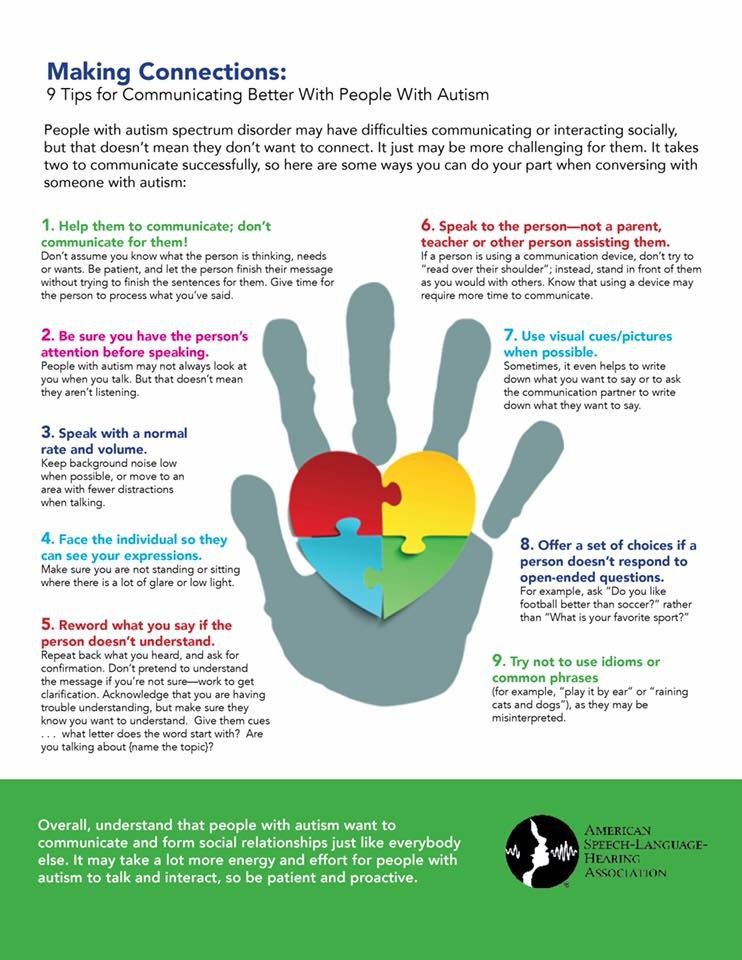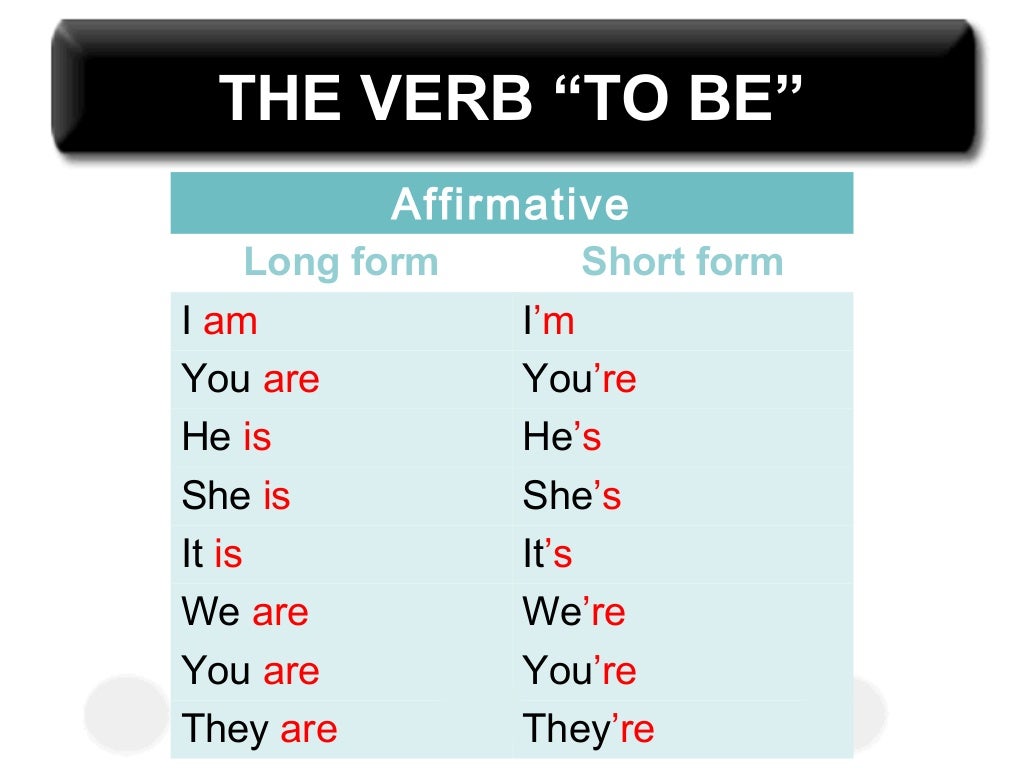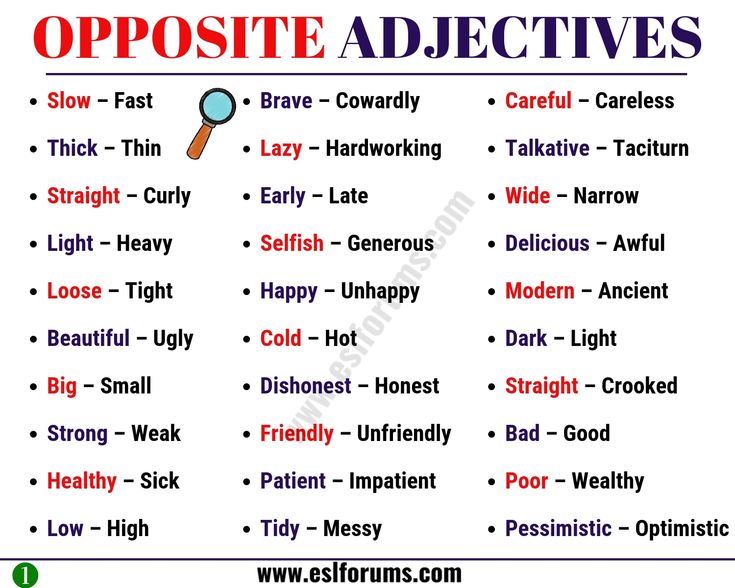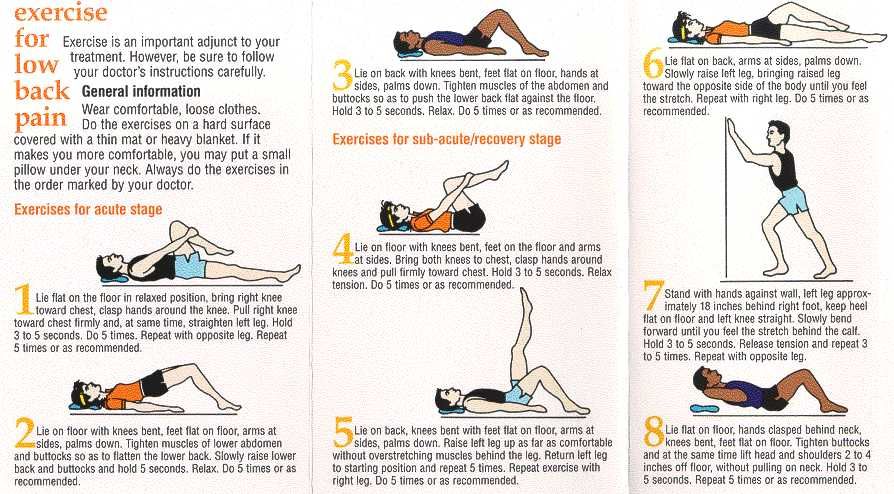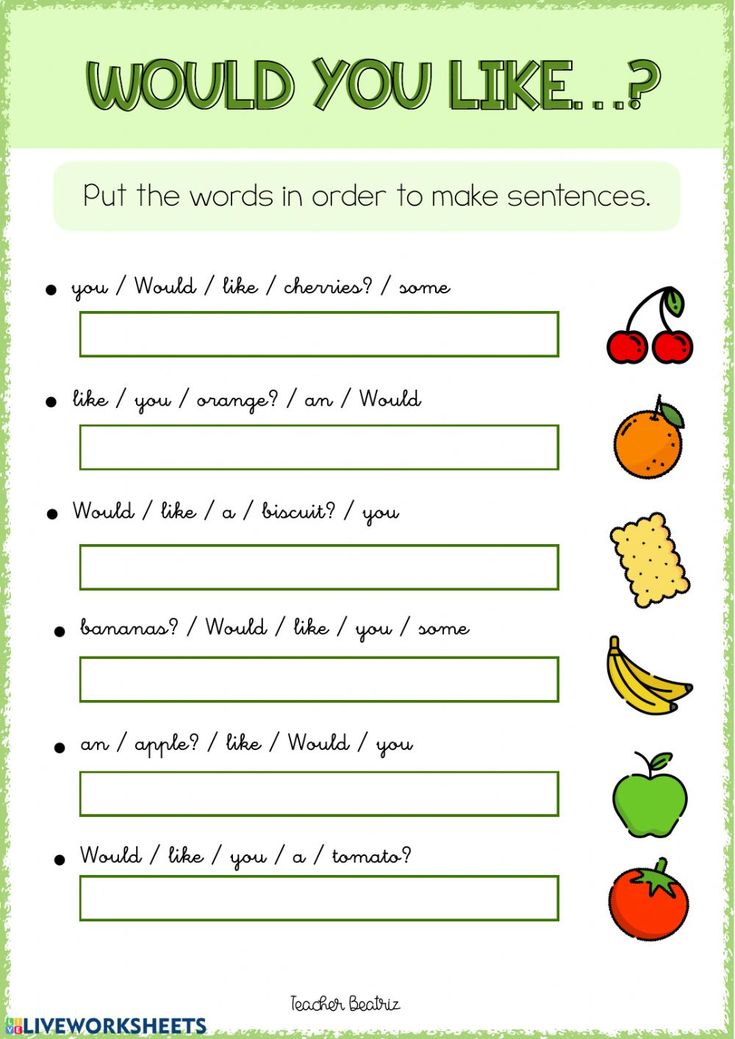Hunger causing anxiety
Can Hypoglycemia Promote Anxiety?
Diabetes and issues with blood sugar are frequently covered in the news. Every day there are numerous reports describe the effects foods and chemicals have on our long term health As such, it's not uncommon for people to worry about how these issues might negatively impact their health and well-being.
As a consequence, many people with anxiety ponder whether they might have hypoglycemia (low blood sugar). Hypoglycemia occurs when there is not enough glucose in the body, starving the brain from necessary resources.
This article explores how anxiety might contribute to symptoms of hypoglycemia and how to help alleviate the symptoms.
Worried About Hypoglycemia? See a Doctor
Your blood sugar is one of the easiest things to diagnose. You can take a simple blood test after fasting for 12 hours and have results in no time. So if you're worried about your blood sugar, talk to your doctor.
Health Causes of Anxiety
Most people that suffer from anxiety worry that it has a physical cause. Although it is necessary to consult a physician in such matters, it is also possible that experience is a result of physical anxiety. In fact, one of the main problems affecting those with anxiety attacks is the constant, nagging feeling that the physical symptoms are too severe to be something as "harmless" as anxiety, and they often look for other explanations for why they may be feeling these symptoms.
First, you need to remember that anxiety causes you to think this way. Anxiety alters thought processes so that "worst case scenario" thinking is more common. In addition, anxiety symptoms can be incredibly severe, and genuinely mimic the symptoms of major health disorders. As much as it may seem hard to believe, your symptoms may not have an overt physical cause, and could simply be a result of anxiety.
But with regard to whether or not hypoglycemia can cause anxiety, the answer is a resounding "Yes." In fact, anxiety is one of the main symptoms of hypoglycemia. Hypoglycemia means that not enough glucose (sugar) is reaching the brain, and this causes the brain a considerable amount of stress, which leads to nervousness and anxiety.
Hunger is Not Hypoglycemia
What you need to realize, however, is that hypoglycemia is fairly rare in those without diabetes. It's caused by problems with insulin medications, excessive alcohol abuse, severe hepatitis, and other health issues that have so many different other symptoms that anxiety is often the least of your worries.
Studies have looked at the relationship between hypoglycemia and panic attacks. A study of 10 panic attack suffers considered with hypoglycemia found that none of them had any signs or symptoms of this condition, especially not before or during the attacks. Another study actually took patients of panic attacks and gave them insulin to induce hypoglycemia, and none of them had an anxiety attack. There is little reason to believe that anxiety and hypoglycemia cause each other in many of those with anxiety disorders.
Most people refer to simple hunger as hypoglycemia, or they refer to it as "low blood sugar." Hunger can cause anxiety symptoms as well..jpg) Without enough sugars and nutrients in your blood, your body becomes stressed, and anxiety is often the result. That's why many people find eating a protein bar or getting some food in the body often appears to take the anxiety away.
Without enough sugars and nutrients in your blood, your body becomes stressed, and anxiety is often the result. That's why many people find eating a protein bar or getting some food in the body often appears to take the anxiety away.
Low blood sugar in this sense is more likely to make your current anxiety symptoms worse, rather than create anxiety symptoms themselves. In other words, those that find that hunger causes anxiety are far more likely to have already had anxiety which hunger makes worse, rather than developing anxiety on its own.
Nevertheless, when blood sugar is lower in the blood stream in any way, it does appear that it can lead to anxiety.
Reactive Hypoglycemia
There is also a type of hypoglycemia that doesn't yet have a very strict diagnosis. It's known as "reactive hypoglycemia," and it occurs when you experience temporary drops in blood sugar after high carbohydrate meals because your body essentially releases too much insulin in response to those carbohydrates.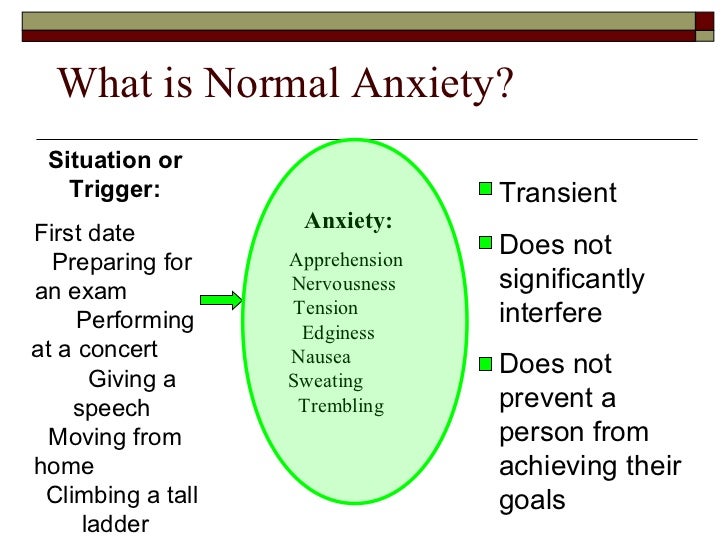
Reactive hypoglycemia may lead to a variety of different symptoms that sound very much like those people with anxiety deal with, including:
- Blurry vision
- Panic attack
- Dizziness
- Fatigue
- Lightheadedness
- Headaches
- Heart Palpitations
Nevertheless, before you decide to diagnose yourself with reactive hypoglycemia, you should note that most of those suffering from this type of hypoglycemia still suffer from issues like enzyme deficiencies, diabetes, presence of a gastric bacteria, or a recent surgery. There are also many tests that can be performed for reactive hypoglycemia to rule it out as a contributing factor.
Treatment for Hypoglycemia Induced Anxiety
Making sure you eat regular, healthy meals is often enough if simple hunger/low blood sugar is causing your anxiety symptoms to get worse. Visiting the doctor to rule out more serious problems is also valuable, because it can help ease the voice in the back of your mind that tries to talk you into believing you're suffering from something worse.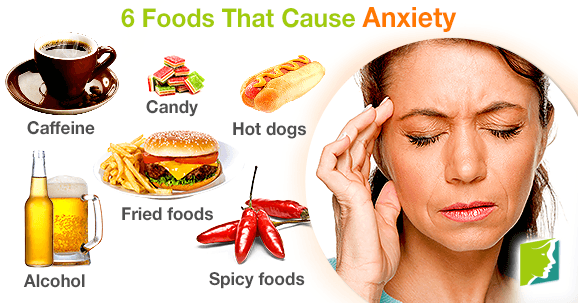 In the rare event that you have some type of hypoglycemic condition, you can get the appropriate treatment.
In the rare event that you have some type of hypoglycemic condition, you can get the appropriate treatment.
But in most of these cases, the problem is still your anxiety. Your anxiety may get worse as a result of low blood sugar, but it would be manageable if you didn't have anxiety to begin with. And never forget that anxiety itself has a tendency to convince people that they have something serious like hypoglycemia.
Was this article helpful?
- Yes
- No
Sources:
- Gorman, Jack M., et al. Hypoglycemia and panic attacks. Am J Psychiatry 141 (1984): 101-102.
- Schweizer, Edward, Andrew Winokur, and Karl Rickels. Insulin-induced hypoglycemia and panic attacks. Am J Psychiatry 143.5 (1986): 654-655.
Do You Get Anxious When You're Hungry?
If hunger and anxiety had a relationship status, it would probably be “It’s complicated.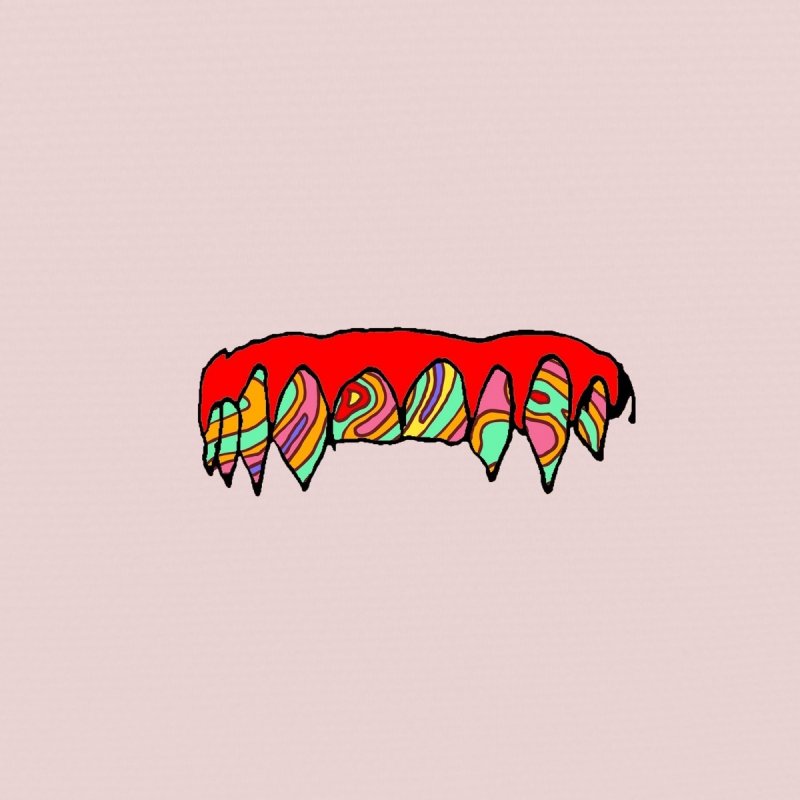 ” Hunger can trigger anxiety; anxiety can both erase hunger and trigger the desire to eat. And there are physical and psychological elements to both hunger and anxiety.
” Hunger can trigger anxiety; anxiety can both erase hunger and trigger the desire to eat. And there are physical and psychological elements to both hunger and anxiety.
To understand why some people get anxious when they’re hungry, read on.
To understand the relationship between hunger and anxiety, it helps to know how two different kinds of hunger operate. Physical hunger happens when your body needs food to keep producing energy. This kind of hunger is stimulated by your body’s biological processes, such as digestion and metabolism, and by hormonal processes, such as the release of cortisol and ghrelin, both of which can affect appetite.
When you’re physically hungry, you may notice an uncomfortable feeling some researchers call “empty hollow sensation” or “hunger pangs.” You may feel clutching contractions in your stomach, which may be your body’s way of draining away any remaining food particles before your next meal. If your blood glucose level has dropped a bit, you may also feel weak, light-headed, irritable, shaky, or tired.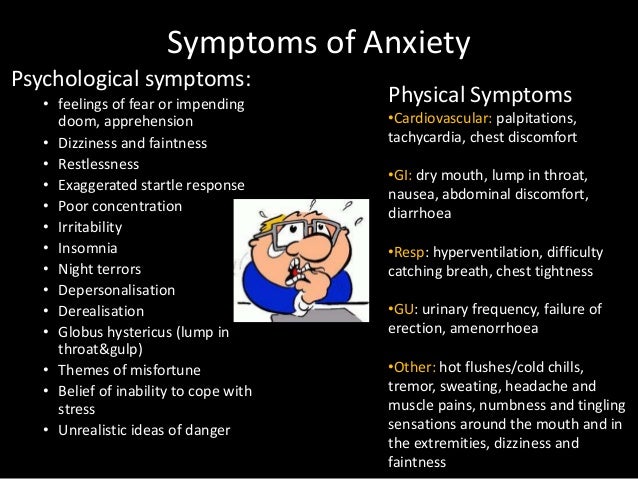
People can also feel a desire to eat at times when they’re not physically hungry. You may feel a kind of psychological hunger if you’re used to eating at regular times, if you’re in social situations where others are eating, or if you typically eat in response to emotional cues. Even seeing photos of food or smelling something cooking can stimulate a feeling of psychological hunger.
Either kind of hunger can make you feel anxious. In fact, the neural networks that stimulate both hunger and stress responses in the body are shared. The hippocampal, pituitary, and adrenal systems (called the HPA axis) prompt both eating behaviors and stress responses, so it isn’t surprising that hunger and anxiety are so closely connected.
In animal studies, researchers found that blocking glucose in rats raised the level of stress hormones in their blood. The researchers discovered that rats had mood changes brought on by hypoglycemia — and they began avoiding the chamber where they had received the glucose-blocker.
Anxiety is a feeling of fear, worry, or apprehension. Symptoms of anxiety include:
- fast heart rate
- quick or shallow breathing
- trembling
- irritability
- sweating
- distracted, worried, panicked, or obsessive thinking
- diarrhea or constipation
- loss of sleep
Anxiety can be brought on by a stressful event, by anticipating stress, or by your thoughts and perceptions.
It’s normal for your blood glucose level to go up and down a bit at different times of day. If you feel uncomfortably hungry, your blood glucose level may be at a lower level.
Hypoglycemia is the medical term for low blood sugar. Hypoglycemia is much more common among people with diabetes. If you’re experiencing hypoglycemia, you might feel:
- nervous
- irritable
- confused
- dizzy
- nauseated
- weak
It isn’t unusual for someone with moderate hypoglycemia to have headaches or blurred vision.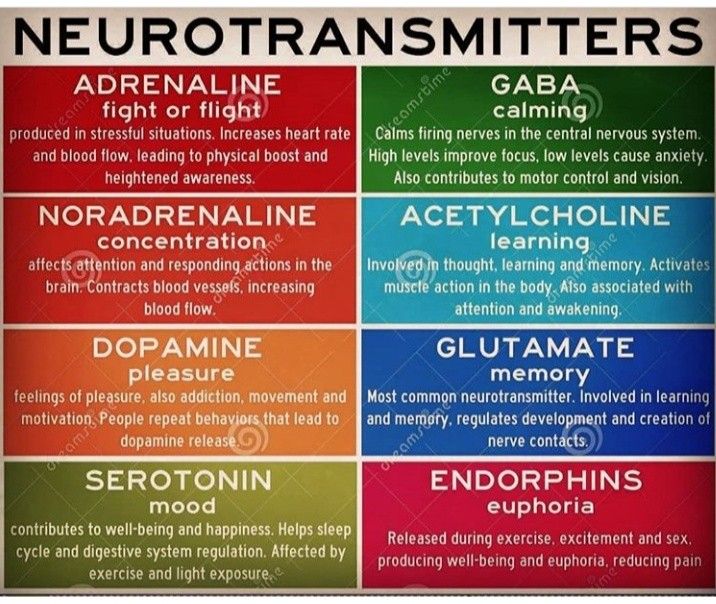 When hypoglycemia is severe, it can lead to seizures, coma, or even death.
When hypoglycemia is severe, it can lead to seizures, coma, or even death.
Because hypoglycemia can be life-threatening when it’s severe, some people with diabetes develop a fear of hypoglycemia. This can make them feel especially anxious when they are hungry. Studies have found that people with a fear of hypoglycemia are more likely to eat more and exercise less, which can then lead to even more changes in their blood sugar levels.
Temporarily, yes. It’s not uncommon for acute or immediate stress to make you lose your appetite completely. Suppressing hunger may be your body’s way of focusing your mind on survival.
If stress continues, though, your body may produce more cortisol, the stress hormone. Cortisol can make you feel a desire to eat and can even make you crave certain kinds of foods. Researchers have found that people who are under prolonged stress are more likely to gain weight and crave calorie-dense foods.
- Listen to your body.
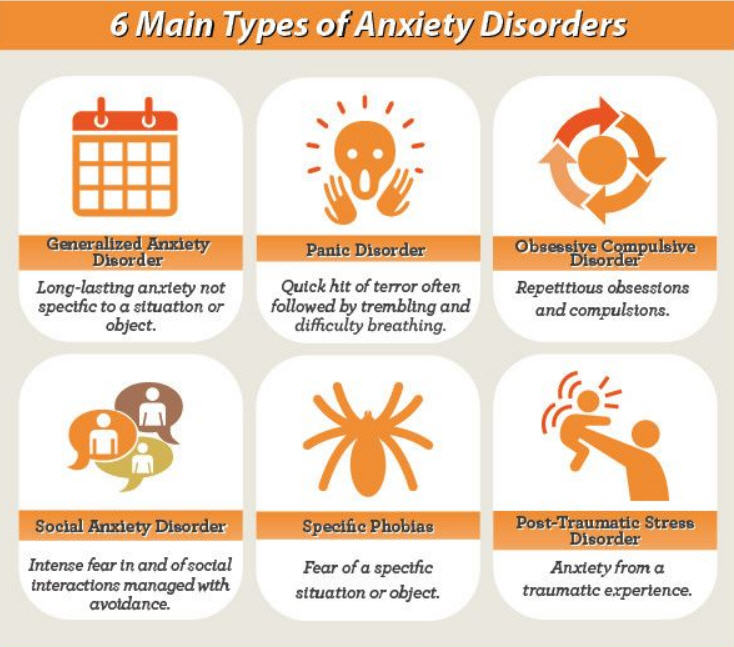 Learning to recognize your body’s hunger signals and getting better at telling the difference between psychological and physical hunger may help you prevent hunger-related anxiety.
Learning to recognize your body’s hunger signals and getting better at telling the difference between psychological and physical hunger may help you prevent hunger-related anxiety. - Eat slowly. You might even consider setting a timer for 20 minutes or so to encourage you to take your time and savor each bite.
- Eliminate distractions. Phones, televisions, and work may keep you from feeling fully satisfied by your meal.
- Consider supplements. Try adding magnesium, selenium, zinc, and omega-3 fatty acids to your diet. They’ve all been linked to lower anxiety levels.
- Exercise regularly. Exercise lowers stress and cortisol (the stress hormone).
- Consult a mental health professional. Therapy may help you manage anxiety and any effects it has on your eating.
For many people, anxiety can be reduced by simple changes to their daily routines. You may want to explore some tried and true relaxation strategies like meditation and mindfulness. Exercising regularly helps, and healthy nutrition can play an important role, too.
If lifestyle changes aren’t enough to fully manage anxiety symptoms, you may want to talk with a healthcare provider or mental health professional about what you’re experiencing. Cognitive behavioral therapy, graduated exposure therapy, and medications have all been effective at helping people manage anxiety.
Mild anxiety is treatable, and many people are able to change their eating habits to prevent hunger from becoming too stressful.
It’s important for people diagnosed with anxiety disorders, people with diabetes, and people with disordered eating to work with healthcare providers to manage hunger-related anxiety. Severe anxiety, left untreated, can lower your quality of life, interfere with your relationships, and raise your risk of serious health conditions.
When you’re physically hungry, you can experience a range of physical and psychological symptoms similar to the ones you experience when you’re anxious.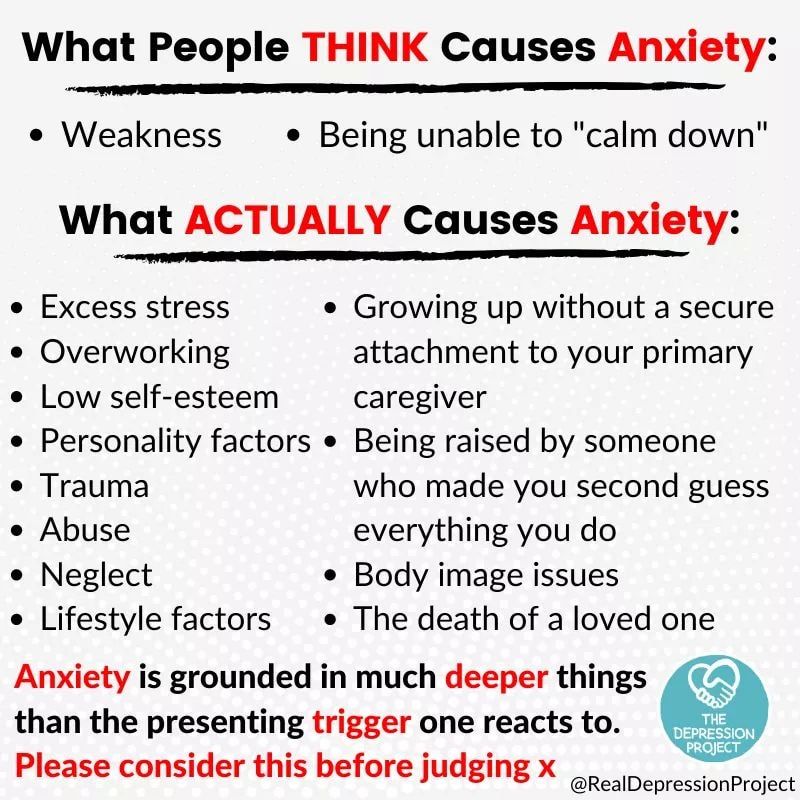 Those similarities may be due to hunger and anxiety sharing the same signaling network and hormones.
Those similarities may be due to hunger and anxiety sharing the same signaling network and hormones.
Grappling with hunger-related anxiety can be a challenge, but there are science-supported methods to cope with this complex set of physical and psychological interactions.
Can hunger cause anxiety?
Can hunger cause anxiety?All articles on authoritynutrition.net are for informational purposes only. Before applying the recommendations, consult with a specialist. Don't risk your health.
- Home
- Diseases
- Symptoms of diseases
Updated: 27 Jan 2021
Ruslan Slobodyanyuk
Why hunger can make you anxious
To understand the relationship between hunger and anxiety, it is useful to know how the two different types of hunger work. Physical hunger occurs when your body needs food to generate energy. This kind of hunger is stimulated by your body's biological processes, such as digestion and metabolism, as well as hormonal processes, such as the release of cortisol and ghrelin, which can affect appetite.
This kind of hunger is stimulated by your body's biological processes, such as digestion and metabolism, as well as hormonal processes, such as the release of cortisol and ghrelin, which can affect appetite.
When you are physically hungry, you may notice an unpleasant feeling that some researchers call "feeling empty" or "hunger pangs." You may feel contractions in your stomach, which may be your body's way of getting rid of leftover food particles before your next meal. If your blood glucose level drops slightly, you may also feel weak, dizzy, irritable, shaky, or tired.
People may also feel like eating when they are not physically hungry. You may feel a kind of psychological hunger if you are used to eating regularly, if you are in social situations where others are eating, or if you habitually eat in response to emotional cues. Even looking at pictures of food or the smell of food being cooked can trigger feelings of psychological hunger.
Any type of hunger can make you anxious and anxious.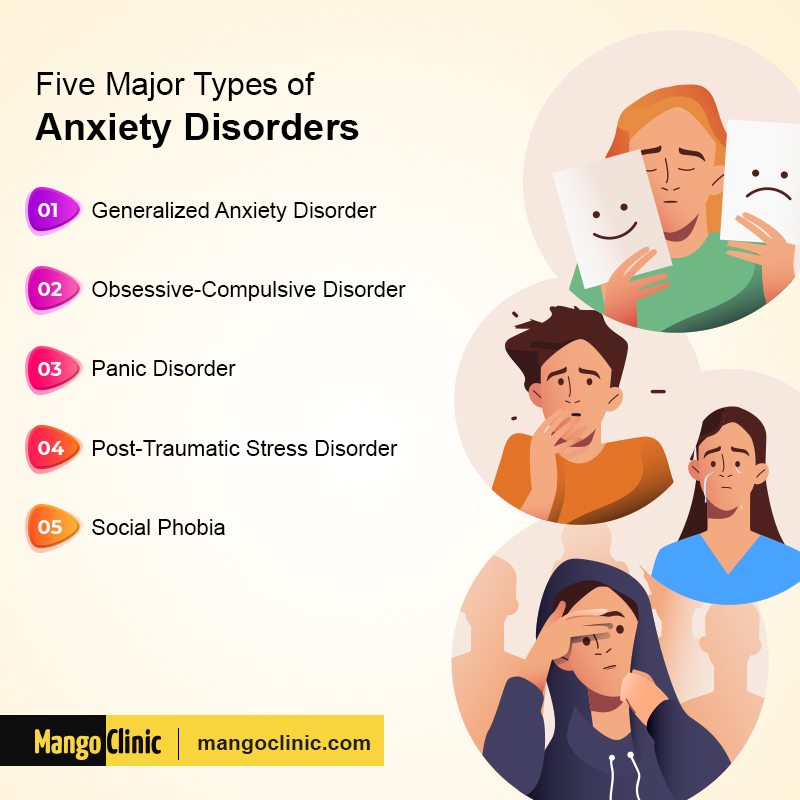 In fact, the neural networks that stimulate the body's response to hunger and stress are common. The hippocampal, pituitary, and adrenal (HPA axis) systems determine both eating behavior and the response to stress, so it's no surprise that hunger and anxiety are so closely linked.
In fact, the neural networks that stimulate the body's response to hunger and stress are common. The hippocampal, pituitary, and adrenal (HPA axis) systems determine both eating behavior and the response to stress, so it's no surprise that hunger and anxiety are so closely linked.
In animal studies, researchers have found that blocking glucose in rats increases the levels of stress hormones in their blood. The researchers found that the rats had hypoglycemia-induced mood changes and began to avoid the chamber in which they received the glucose blocker.
What is anxiety?
Anxiety is a feeling of fear, worry or apprehension. Anxiety symptoms are:
- rapid heartbeat
- rapid or shallow breathing
- shiver
- irritability
- sweating
- distraction, anxiety, panic or intrusive thoughts
- diarrhea or constipation
- insomnia
Anxiety can be caused by a stressful event, the anticipation of stress, or your thoughts and perceptions.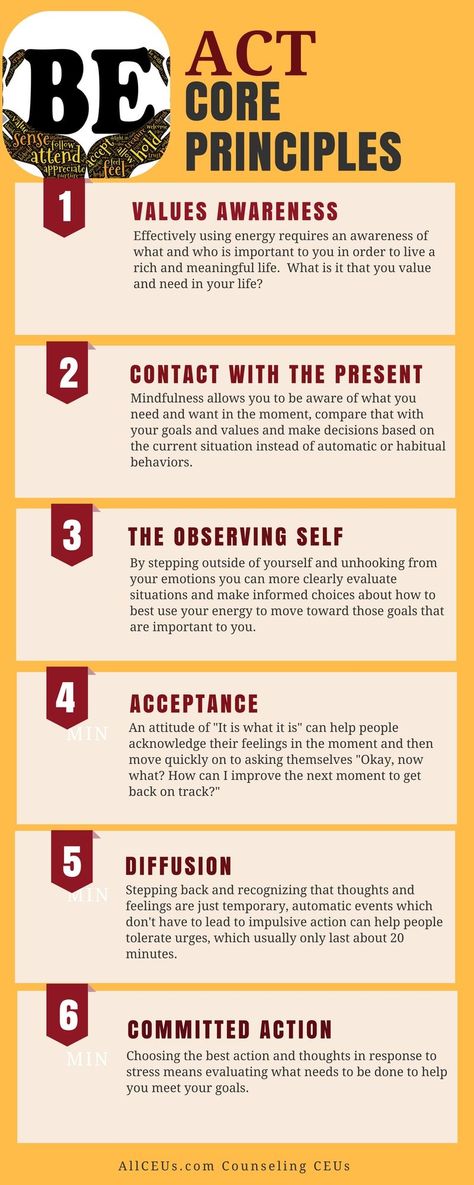
Hunger, anxiety and hypoglycaemia
Blood glucose may rise and fall slightly at different times of the day. If you feel uncomfortable hunger, you may have low blood glucose.
Hypoglycemia is the medical term for low blood sugar. Hypoglycemia is much more common in people with diabetes. If you suffer from hypoglycemia, you may experience:
- nervousness
- irritability
- confusion
- dizziness
- nausea
- weakness
People with mild hypoglycemia often have headaches or blurred vision. When a person has severe hypoglycemia, they may experience seizures, coma, or even death.
Because severe hypoglycemia can be life-threatening, some people with diabetes develop a fear of hypoglycemia. This can cause them particular anxiety when they are hungry. Studies have shown that people who fear hypoglycemia are more likely to eat more and exercise less, which can lead to even greater changes in blood sugar levels.
Can anxiety make you less hungry?
Temporarily yes. Often acute or immediate stress leads to a complete loss of appetite. Hunger suppression may be your body's way of keeping your mind focused on survival.
However, if stress continues, your body may produce more cortisol, the stress hormone. Cortisol can make you want to eat and even crave some foods. Researchers have found that people who are under prolonged stress are more likely to gain weight and crave high-calorie foods.
Coping with anxiety overeating
- Listen to your body . By learning to recognize your body's hunger signals and learning to distinguish between psychological and physical hunger, you can help prevent hunger-related anxiety.
- Eat slowly . You might even consider setting a timer for 20 minutes or so to encourage yourself to take your time and enjoy every bite.
- Get rid of distractions .
 Smartphones, TVs, and work can keep you from feeling fully satisfied with food.
Smartphones, TVs, and work can keep you from feeling fully satisfied with food. - Consider adding . Try including magnesium, selenium, zinc, and omega-3 fatty acids in your diet. All of them are associated with a decrease in anxiety levels.
- Exercise regularly . Exercise reduces stress and cortisol (the stress hormone).
- Consult a mental health professional . Therapy can help you deal with anxiety and any effects it has on your diet.
How is anxiety treated?
Many people can reduce anxiety simply by changing their daily routine. You may want to explore some tried and true relaxation strategies such as meditation and mindfulness. Regular exercise and a healthy diet can help.
If lifestyle changes are not enough to completely eliminate your anxiety symptoms, you can talk to your doctor or mental health professional about what you are experiencing. Cognitive behavioral therapy, graduated exposure therapy, and medications are all effective in helping people manage anxiety.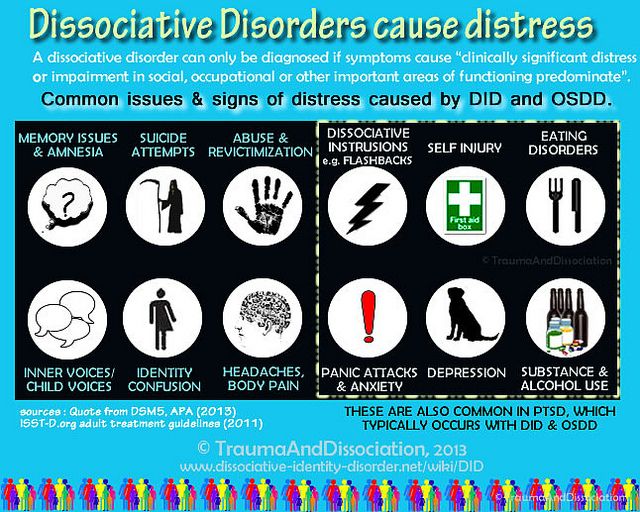
What is the prognosis for people with anxiety?
Mild anxiety is treatable and many people can change their eating habits to keep hunger from becoming too stressful.
For people diagnosed with anxiety, diabetes, and an eating disorder, it is important to work with a doctor to manage hunger-related anxiety. Severe anxiety, if left untreated, can reduce your quality of life, interfere with your relationships, and increase your risk of developing serious illnesses.
To summarize
When you are physically hungry, you may experience a range of physical and psychological symptoms similar to those you experience when you are anxious. This similarity may be due to hunger and anxiety being linked to the same signaling network and hormones.
Dealing with hunger-related anxiety can be a challenge, but there are scientifically proven methods to deal with this complex set of physical and psychological interactions.
Sources
- Alramadhan E, et al.
 (2012). Dietary and botanical anxioltyics.
(2012). Dietary and botanical anxioltyics.
ncbi.nlm.nih.gov/pmc/articles/PMC3560823/ - Chand S. (2020). Anxiety.
ncbi.nlm.nih.gov/books/NBK470361/ - Ciampolini M, et al. (2013). Hunger can be taught: Hunger recognition regulates eating and improves energy balance.
ncbi.nlm.nih.gov/pmc/articles/PMC3698025/ - Fond G, et al. (2013). Fasting in mood disorders: Neurobiology and effectiveness. A review of the literature.
hal.archives-ouvertes.fr/inserm-00789122 - Horman T, et al. (2018). An exploration of the aversive properties of 2-deoxy-D-glucose in rats.
link.springer.com/article/10.1007/s00213-018-4998-1 - Hussin N, et al. (2013). Efficacy of fasting and calorie restriction (FCR) on mood and depression among aging men.
pubmed.ncbi.nlm.nih.gov/24097021/ - Hypoglycemia (low blood sugar). (n.d.).
diabetes.org/healthy-living/medication-treatments/blood-glucose-testing-and-control/hypoglycemia - Kandola A, et al.
 (2020). Exercise and anxiety.
(2020). Exercise and anxiety.
pubmed.ncbi.nlm.nih.gov/32342469/ - Link between hunger and mood explained. (2018).
sciencedaily.com/releases/2018/09/180925115218.htm - Martyn-Nemeth P, et al. (2017). Fear of hypoglycemia: Influence on glycemic variability and self-management behavior in young adults with type 1 diabetes.
pubmed.ncbi.nlm.nih.gov/28143733/ - Watkins E, et al. (2016). The psychological effects of short-term fasting in healthy women.
ncbi.nlm.nih.gov/pmc/articles/PMC4992682/ - Yau Y, et al. (2013). Stress and eating behaviors.
ncbi.nlm.nih.gov/pmc/articles/PMC4214609/
The material is based on scientific data. The numbers in brackets (1, 2, 3) are interactive links to peer-reviewed scientific articles. Prepared by experts for informational purposes only. It should not be used as a guideline for the treatment of disease and is not a substitute for professional medical advice, diagnosis or treatment. In case of illness or any symptoms, you should not self-medicate and should always consult a doctor.
In case of illness or any symptoms, you should not self-medicate and should always consult a doctor.
Ruslan Slobodyanyuk
Fact checker and editor in chief of authoritynutrition.net.
Expert check carried out by:
Evgeniy Dubrovsky – candidate of medical sciences, physician of the highest category, certified clinical nutritionist.
More in this category: Can asthma cause fatigue and weakness? Multiple sclerosis and headaches »
New on site
-
02 Feb 2023
What you need to know about celiac rash -
26 Jan 2023
What foods can help prevent stroke? -
19 Jan 2023
What is the best diet for prostate cancer? -
12 Jan 2023
Does smoking cause high cholesterol? -
03 Jan 2023
What you need to know about garlic and cholesterol
Why do we eat stress? Relationship between anxiety and hunger
If hunger and anxiety had relationship status on VK, it would probably be "It's complicated.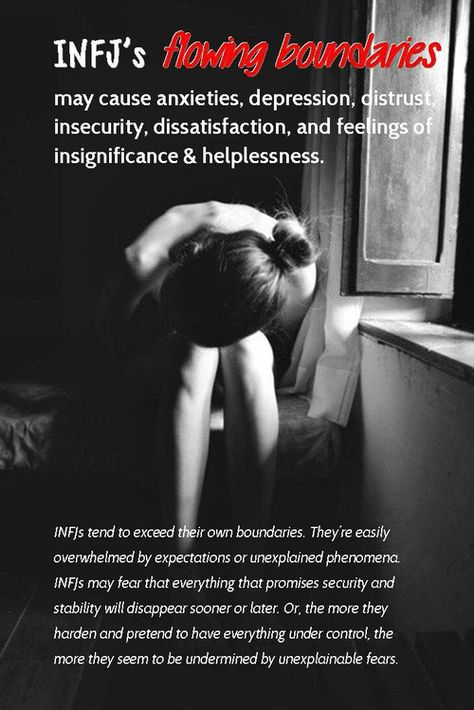 " Hunger can cause anxiety, and it, in turn, can both suppress appetite and increase it.
" Hunger can cause anxiety, and it, in turn, can both suppress appetite and increase it.
Both states have physical and psychological elements. To understand why some people feel anxious when they are hungry (and vice versa), read on.
Why hunger can make you anxious
To understand the relationship between hunger and anxiety, it is helpful to know how the two different types of hunger work.
Physical hunger
It occurs when the body needs food to keep producing energy. This type of hunger is stimulated by biological processes in the body, such as digestion and metabolism, as well as hormonal ones, such as the release of cortisol and ghrelin, which can affect appetite.
-
Food
Bring a ram, urgently: 13 reasons why you are always hungry like a dog
When you are physically hungry, you may notice an unpleasant feeling that some researchers call "feeling of emptiness" or "hunger pangs.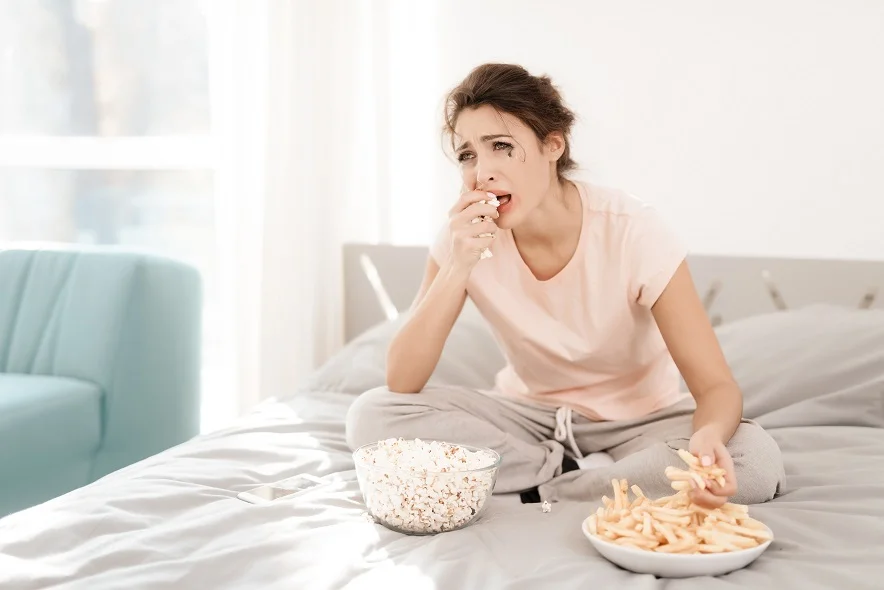 " You may feel stomach contractions, which are the body's way of using up any leftover food particles before the next meal.
" You may feel stomach contractions, which are the body's way of using up any leftover food particles before the next meal.
If your blood glucose drops slightly, you may also feel weak, dizzy, irritable, trembling, or tired.
Psychological hunger
People may also feel like eating when they are not physically hungry. Such psychological hunger can be felt if you are used to eating at a certain time, people around you eat, or if you eat frequently in response to emotional cues. Even the sight of photographs of food or the smell of something being prepared can stimulate feelings of psychological hunger.
Any kind of hunger can make you anxious. The fact is that the neural networks that stimulate the body's response to hunger and stress are common. The hippocampus, pituitary, and adrenal glands stimulate both eating behavior and the stress response, so it's no surprise that hunger and anxiety are so closely linked.
Lack of appetite VS stress eating
Can anxiety suppress hunger? Temporarily yes.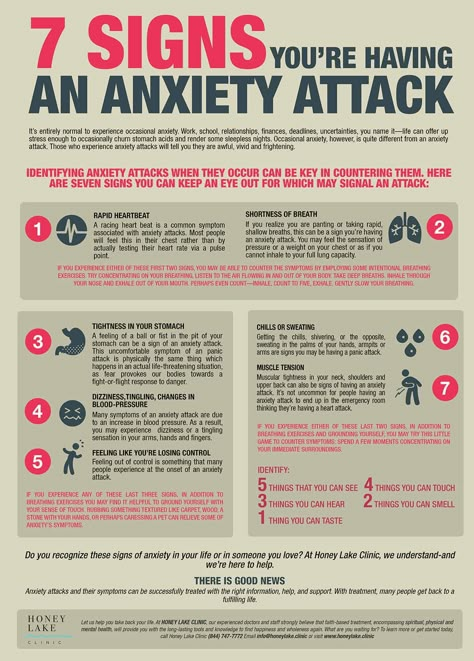 It is not uncommon for a person to completely lose their appetite during times of acute or unexpected stress. Hunger suppression may be the body's way of focusing its mind on survival.
It is not uncommon for a person to completely lose their appetite during times of acute or unexpected stress. Hunger suppression may be the body's way of focusing its mind on survival.
However, if stress continues, the body may produce more cortisol, the stress hormone. He, in turn, is able to make you feel the desire to eat and even begin to crave certain types of food.
Researchers have found that people who are under prolonged stress are more likely to gain weight and crave high-calorie foods.
How to Stop Stress Eating: 5 Tips
What to do if constant stress causes you psychological hunger? Here are some helpful tips from experts.
1. Listen to your body
By learning to recognize body signals and distinguish between psychological and physical hunger, you will be better able to decide whether you need to eat or calm down now.
-
Money and career
3 scientifically proven ways to get rid of stress and become more productive Take note.
